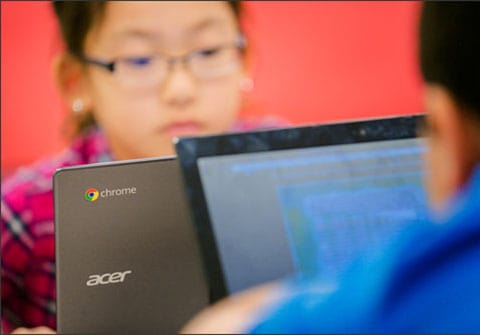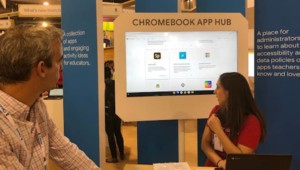Google for the Win: The Ascendence of Chromebooks & Google Apps

With 2016 just around the corner we are looking back at trends with a #YearInReview series — check out the 1,500+ smart people doing innovative work we shared as part of the 3rd Annual Smart Lists, and why 2015 was the year of the mobile (finally).
We recently visited six leading Bay Area schools which deploy a variety of strategies and formats. The one thing they all had in common was Google Chromebooks and extensive use of Google Apps for Education.
The same was true for leading schools we recently visited in Denver (e.g. Grant-Beacon and DSST) and New Orleans (e.g. KIPP, Renew, Sci Academy).
Chromebooks now make up more than half of all devices in U.S. schools, according to a new report, up from nothing in January 2012 when they hit main stage at FETC.
Add Android devices and Google’s EdTech share climbs to 53 percent. Google’s rise came at the expense of Apple and Microsoft which both lost about half their market share of new devices.
“It’s been amazing to us to see that growth happen just in that short amount of time,” said Rajen Sheth, director of product management for Android and Chrome in business and education. “If you look at the overall market for devices in education, it’s actually expanded a lot and Chromebooks have actually taken a lot of the expansion.”
Google’s Chromebooks make up 4.4 million of the 8.9 million devices sold to schools this year. About 30,000 Chromebooks are activated every day.
Why? Educators tell us Chromebooks are:
- Inexpensive. About $200 compared to $900 Mac Air or Microsoft Surface.
- Built for Google Apps. Charlotte-Mecklenburg teachers picked Chromebooks because they wanted to use the free suite of online applications for word processing, spreadsheet work and presentations.
- Suited to online assessment. The big state testing consortia required keyboards for testing making Chromebooks a better fit than tablets.
- Easy to configure and administer. They boot up quickly, have a long battery life, are easy to update, and are not prone to malware and viruses.
For more check out:
Stay in-the-know with all things EdTech and innovations in learning by signing up to receive the weekly Smart Update.






@Antonio_Baez
I was to Buy an Apple, after 2 broken down Laptops, I's looking for an unexpensive device, but reliable. I really found it in a Chromebook.